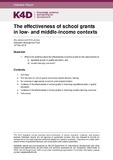| dc.contributor.author | James, Zoe | |
| dc.contributor.author | Joynes, Chris | |
| dc.date.accessioned | 2019-01-15T11:38:42Z | |
| dc.date.available | 2019-01-15T11:38:42Z | |
| dc.date.issued | 2018-12-12 | |
| dc.identifier.citation | Joynes, C. and James, Z. (2018). The effectiveness of school grants in low- and middle-income contexts. K4D Helpdesk Report 514. Brighton, UK: Institute of Development Studies | en |
| dc.identifier.uri | https://opendocs.ids.ac.uk/opendocs/handle/20.500.12413/14275 | |
| dc.description.abstract | This helpdesk review has drawn primarily on evidence from systematic reviews and synthesis studies focused on the effectiveness of school grants for the improvement of (i) equitable access to quality education, and (ii) the student learning outcomes. The rationale for school grants has emerged as part of relatively recent policy-driven practices for educational decentralisation and, within that, school-based decision-making. The devolution of a range of decisions to the school-level is assumed to improve accountability, efficiency and responsiveness to local needs (Bruns et al. 2011; Carr-Hill et al. 2016; Slater 2013). These decisions may include concerns related to curricula, finance, management and teachers, and may be taken at one or more administrative level (Bruns et al. 2011; Slater 2013). The literature identifies several key principles for effective implementation. This includes an acknowledgement of the range of challenges and barriers that are associated with the implementation of these type of models at the school level, including (i) the need for all actors to support the principles of decision-making reform; (ii) the need for local district support; and (iii) the reality that this type of reform places increased time and work demands on teachers and parents (Bruns et al. 2011). The review found that evidence of the effectiveness of school grant policies for equitable access to quality education was limited. Few studies provided rigorous examinations of the impact of school grants on equity of access across a range of measures, for example between rural/ urban locations, gender, or socio-economic status. The evidence base is relatively stronger in relation to the effectiveness of school grant policies for student learning outcomes, being suggestive of small but positive impacts. However, according to a 2016 synthesis study, these positive results are concentrated in middle-income countries, and stronger impacts tend to be found for wealthier students with more educated parents, with smaller effects found in disadvantaged communities (Carr-Hill et al. 2016; see also Hanushek et al. 2011; UNESCO 2017). | en |
| dc.language.iso | en | en |
| dc.publisher | IDS | en |
| dc.relation.ispartofseries | K4D Helpdesk Report;514 | |
| dc.rights.uri | https://www.nationalarchives.gov.uk/doc/open-government-licence/version/3/ | en |
| dc.subject | Aid | en |
| dc.subject | Children and Youth | en |
| dc.subject | Development Policy | en |
| dc.subject | Education | en |
| dc.subject | Rights | en |
| dc.title | The Effectiveness of School Grants in Low- and Middle-Income Contexts | en |
| dc.type | Helpdesk | en |
| dc.rights.holder | © DFID - Crown copyright 2018. | en |
| dcterms.dateAccepted | 2018-12-12 | |
| rioxxterms.funder | Department for International Development, UK Government | en |
| rioxxterms.identifier.project | K4D | en |
| rioxxterms.version | VoR | en |
| rioxxterms.funder.project | 238a9fa4-fe4a-4380-996b-995f33607ba0 | en |

